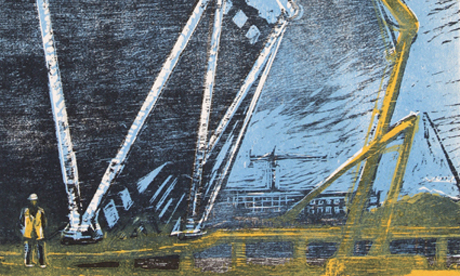The East End’s Olympic hopes are being dashed

Marianne Fox Ockinga, woodcut of the Olympic stadium
The floodlights have been switched on at the Olympic stadium – a landmark that lights up the area for miles around. The Olympics and Paralympics in 2012 offer a fantastic opportunity for Britain, in hosting an amazing month of sport and culture, to show our country at its best.
However, for many in the neighbouring East End of London, while there is great pride there is also unease about the legacy. The Inspire video at the core of London’s bid – with its uplifting images of young people from around the world inspired by the London games, reflecting the strength in Britain’s dynamism, diversity, youth and creativity – won over many at home and abroad. It also marked a change: it wasn’t the hackneyed glitz of "Cool Britannia" or the old-world charms of tourist biscuit-box Britain.
We saw a reflection of a modern and confident nation, and at the heart of our bid the electric atmosphere of the East End. Many local people came to see the Olympics as a great opportunity, and have great hopes for the games. But the organisers are yet to win over many local residents and demonstrate that these games will be truly inclusive.
The surrounding boroughs of Hackney, Newham and Tower Hamlets are among the most deprived in Britain. We want the games to be an open celebration for the whole city – not just for those who can afford or are allocated tickets, but something that reaches out into communities and on to the streets. But it is now clear that the Olympic organising committee, Locog, doesn’t have concrete proposals for increasing local job opportunities, and its plans for providing tickets for the games for local young people are inadequate – despite the fact that the local community is putting up with considerable disruption and cost.
When I asked last year how many local residents from the host boroughs were employed at the Olympic site, I was informed that of the 6,000 onsite jobs created, only 201 were held by residents from Tower Hamlets and just 133 from Hackney. The host boroughs have invested in making sure the local workforce have the right skills, especially for the construction industry, but many local people feel excluded and are resentful they can’t break through. There are still over 100,000 jobs during the games to be filled – this is an important opportunity for local residents, which we cannot allow to slip by.
And to add insult to injury, this week we saw a new threat to the Olympic stadium, with a battle between two Premier League football clubs, Tottenham and West Ham, over their competing visions for the site. It goes to the heart of questions about regeneration and the Olympic legacy, and whether the new stadium should be retained, or if the East End should lose the ability to stage athletics in the stadium.
Already the only opportunity to see a free Olympics event that local people would have access to – the marathon – looks set to be denied to them. The chairman of the organising committee, Lord Coe, and his colleagues have switched the route from the streets of east London to central London. This was despite having made a commitment in the bid, and despite Tower Hamlets council spending £10m on improving the local area in preparation. It will be one the few Olympic marathons not to finish inside the main stadium. A YouGov poll found almost half of Londoners wanted to see the 26-mile event staged through Tower Hamlets to finish in Stratford. Only 27% preferred a central London route. Originally, Tower Hamlets had been set to host the basketball, walking race and marathon, but these have all been moved – leaving it without any Olympic events.
Last September, I appealed to Locog with other East End MPs, councils and the local media to think again about the marathon route, but our concerns were swept aside. Tower Hamlets council is now seeking a judicial review of Locog’s decision, in order to return the marathon to our East End streets and with the finish line rightly in the magnificent new stadium. This will be heard within days. It’s a shame it has had to come to this, but I hope it focuses minds.
Only last week I received a letter from Mulberry school for girls, my former secondary school, from pupils working on a project about the Olympics and the changes to the marathon route. A year and a half before the games they feel "taken advantage of and ignored". And, far from feeling excited and energised by the games, they are setting up a petition to fight the route change. Faith groups like Victoria Park Baptist Church have also told me that the area’s diversity has been ignored.
I have a great deal of admiration for Coe, for the important work he is doing. But he and his colleagues must make sure that, in the years to come, the local population’s recollection of the Olympics will not be of something that they barely caught a glimpse of. We should not be looking back and asking: why didn’t we do more to ensure a lasting legacy? Why weren’t local people given a starring role? And why didn’t the games live up to their promise?
guardian.co.uk © Guardian News & Media Limited 2010
Published via the Guardian News Feed plugin for WordPress.
